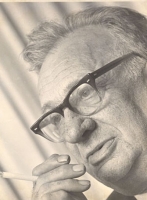
Year Born:
1902
Year Died:
1975
Pioneer
Lewis, Richard Guildford “Dick” (1902-1975)
If there is any truth to that age old saying – “a man is known by the company he keeps” – then Dick Lewis walked among the Titans. The Titans in this case were the original broadcasters in Canada. Individuals who came from all kinds of backgrounds from butchers and bakers to engineers and lawyers to plunge into the then unknown and revolutionary world of “radio.” To these men and many, many, others Dick Lewis was their friend, their conscience and their “public voice” which for more than 30 years rang loud and clear through the pages of the magazine he founded, Canadian Broadcaster.
Born Richard Guildford Lewis, the son of an English barrister, in England in 1902, he was schooled in the classics and following a succession of French-speaking governesses, he spent a year of total French immersion in Neuchatel, Switzerland at the prestigious L’Ecole Superieure de Commerce. He arrived in Canada just prior to his 21st birthday in 1923 and immediately got a job on a farm, just north of Chatham, Ontario. He later worked at everything from selling vacuum cleaners, clerking in a department store, and selling printing, to driving a taxi, but in the early 1930’s he started writing, and he never stopped until his death in 1975.
Initially Dick was writing radio drama scripts for CHML and CKOC in Hamilton. One program was known as “Danny and His Dad.” He wrote the script for which he received a certain sum; he played the Dad for which he got a talent fee, and also wrote in a part for an “English “voice, for which he received another fee.
In 1936, when the CBC was formed, it was also given regulatory power over all private broadcasting, which annoyed Dick no end. That situation started him on a 30 year relentless crusade. Sometime in 1941, a friend said “Dick, why don’t you start a trade paper for the broadcasting industry?”. And he did, reportedly with 75 cents in his pocket! The first issue of Canadian Broadcaster, all eight pages of it, appeared on January 8th, 1942.
Dick started a column called “Over the Desk”, which along with the editorial page of Canadian Broadcaster was the platform from which he championed the cause of private broadcasting in Canada. He was vociferous in his attacks against government control and regulation, as well as confronting various pressure groups who for one reason or another wanted to muzzle or in some way restrict the use of the air-waves. The balance of the magazine carried news about people, places and events concerning broadcasting across Canada, and of course advertising – from stations seeking to make their station known to national advertisers, equipment suppliers peddling their wares to stations and national sales representative firms seeking stations as clients.
In 1946, largely to off-set the negative publicity being given the industry by the press, he instituted the Beaver Awards to honour distinguished service to Canadian Broadcasting. They were handled on a national basis, thanks to the co-operation of the Borden Company, which carried them on the country wide program “Canadian Cavalcade”.
Probably the most tangible proof of the extent to which Dick had become an integral part of the industry occurred in 1958. At the CAB convention in Toronto Dick Lewis was made the first honorary associate member of the association. Some eight years later a similar event took place at the ACRTF, when he was made an honorary life member. Another honour of which he was extremely proud was the Silver Medal bestowed on him by the Association of Canadian Advertisers.
With the advent of television, the regulation of broadcasting passed from the CBC to the Board of Broadcast Governors, which was set up in 1958 as an independent regulatory body that held sway over both public and private broadcasting, a long sought-after goal of the CAB. Though Dick became a good friend of BBG Chairman Dr. Andrew Stewart, an amiable Scot, Dick continued his relentless attack against government control of media, particularly radio and television.
The BBG was succeeded in 1968 by the CRTC, headed by Pierre Juneau as Chairman, and another long time friend of Dick’s, Harry Boyle, late of the CBC, as Vice-Chairman. Yet his attacks against the existence of a commission and government control continued, and his editorials continued to be scathing.
Another side of Dick was his interest in what he euphemistically referred to as his “d.p.’s” – “damned protégés”. These were young people trying to get into the media business – across Canada people would say: “Go and see Dick Lewis, he will help you”. And help them he did. While nobody ever kept count, it is a safe bet that over the years several hundred people could thank Dick for getting their foot in the door and their first job. He didn’t care where you were from or your background – if he liked the “cut of your jib” he would help you.
Dick, a confirmed bachelor, lived in an upper floor duplex in one of south Rosedale’s old stately homes. He was member of the Royal Canadian Yacht Club, although he never did any boating. He was an armchair admiral who enjoyed the view from the lounge and the dining room. He was also a member of the Albany Club.
Dick Lewis lived by a very simple code –“it costs no more to be as nice to the guy that picks up your garbage as you are to your bank manager” – and he practised it until the day he died. It was truly said of Dick: “He touched many lives and they were all better off for it”
Richard G. Lewis was a Titan. He died in 1975 of complications following a stroke.
Written by Ian Grant – May, 2007
